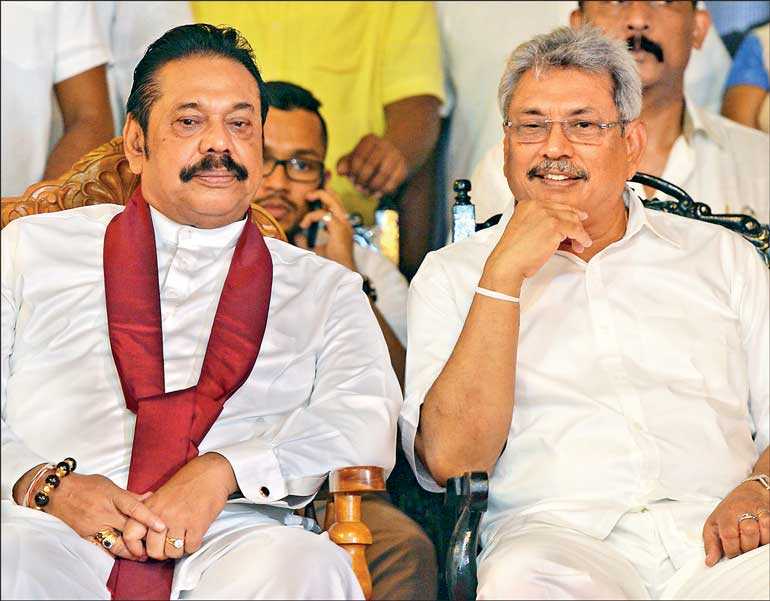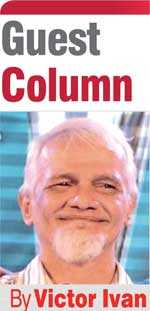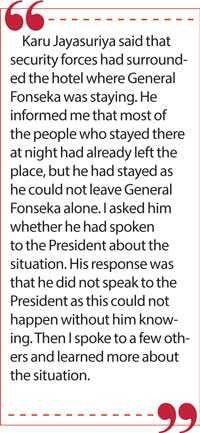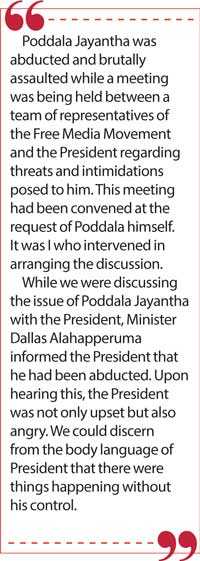Thursday Feb 19, 2026
Thursday Feb 19, 2026
Friday, 25 October 2019 00:00 - - {{hitsCtrl.values.hits}}

The 2010 Presidential Election was a royal battle fought between two war heroes. President Mahinda Rajapaksa, who gave the war its political leadership, was able to defeat General Sarath Fonseka, who  had given it its military leadership. In the 2015 Presidential Election, President Mahinda Rajapaksa was defeated not by an equally powerful leader, but by a small man from Polonnaruwa.
had given it its military leadership. In the 2015 Presidential Election, President Mahinda Rajapaksa was defeated not by an equally powerful leader, but by a small man from Polonnaruwa.
The Civil War had produced three major war heroes. They were Mahinda Rajapaksa, General Sarath Fonseka and Gotabaya Rajapaksa respectively. General Fonseka was defeated by Mahinda Rajapaksa and Mahinda Rajapaksa was defeated by Maithripala Sirisena. It is Gotabaya Rajapaksa, the third hero, who has become the candidate of the Presidential Election 2019.
By the end of the Civil War, the vulgarity of the atmosphere created by violent conflicts which had persisted for nearly 30 years had reduced the State and its social system to the maximum in degeneration and decay. My reading of this situation was that the absence of a far-reaching vision for the ruling party of Sri Lanka that could arrest this situation and restore and recreate the degenerated State would inevitably plunge the country into a serious state of anarchy. Not only did I comment on it at the time, orally and in writing, but also wrote and published a book about it in 2011.
I knew that General Sarath Fonseka could be a prospective contestant for Mahinda Rajapaksa at the 2015 Presidential Election long before his name was announced. I was curious to know what President Mahinda Rajapaksa thought about it. “What would happen if General Fonseka happens to be your Opposition candidate at the next Presidential Election?,” I asked the President when he spoke to me over the phone.
Although my question was of interest to him, he did not believe that General Fonseka would contest against him. “Every Wednesday, the chiefs of the three Armed Forces and their wives used to have lunch with me; if they have grievances, they can tell me. If they can’t tell me, they can tell Shiranthi. I have accorded the three commanders a great honour and recognition; they are invited to every banquet given to the heads of states visiting Sri Lanka.” Having said that, he concluded, “I do not believe that Sarath Fonseka will do that.”
A few days later, the President called me again. As I recall, he started the conversation with the remark “you’re amazing”. After my information, he had asked Gotabaya and the heads of the intelligence services whether Sarath Fonseka would contest against him. None of them were aware that that was the case. The President had called me only after having it clarified that General Fonseka had decided to contest. “Gota does not know that Sarath Fonseka was going to contest. Even the intelligence services don’t know, but Victor Ivan knows,” he said, ending the conversation.
I did not want the conversation to end there. I posed another question to the President that intrigued me. A commander-in-chief of the Army who is in service can contest an election only if his request meets with the approval of the President, the Commander-in-Chief of all three Armed Forces. I asked the President whether he would grant him the approval to contest. 
“Yes, I approve of it; may God take care of me if he wins; and if I win, it will be the same for him, God will have to take care of him,” was his immediate reply. I must say that I was impressed by his greatness in deciding to allow Sarath Fonseka to contest despite the risks posed to him.
2010 Presidential Election
General Fonseka played an important role in the victory of the internal civil war. I have a great respect for him for that. But I did not see it a wise move for him to enter into the hot ground of the political battlefield and contest the Presidential Election soon after leaving the battlefield of war. A military mind is necessary for military service, but a ruler should be a civilian not of a military disposition. My view was that, if a person like General Fonseka was to be the leader of the country, it would have to be after engaging in civic politics for some time. I made my point public, and my calculation was that Mahinda Rajapaksa will have an easy victory in the contest between the two, contrary to popular belief that prevailed in the country.
If the UNP did not contest the 2010 Presidential Election and paved the way for Mahinda Rajapaksa, the leader who won the war, to return uncontested, it would have been in the best interests of the country as well as for the UNP. In view of the height of popularity he had gained in the immediate aftermath of the military victory, the UNP at that moment did not have real potential to defeat President Rajapaksa. Taking cognisance of this situation and as a mark of honour for the victory of war, if Mahinda Rajapaksa had been allowed to win the Presidential Election uncontested without the UNP fielding a candidate, they could have demanded that Mahinda Rajapaksa initiate political reforms that were necessary for the country in the aftermath of the ending of the war. If that happened, the UNP could have prevented the drastic collapse of its voter base and preserved its position as a strong parliamentary group. Furthermore, if it happened that way, perhaps Rajapaksa may have had to bring about political reforms that the Opposition demanded and prevented the relationship between the Opposition and the Government becoming antagonistic. The end result of such an eventuality would have been a creation of a mild regime rather than a repressive one and the containment of the massive increase in the electoral base of President Rajapakse.
I indicated this idea to the UNP leader after the 2010 Presidential Election, in a conversation which was also attended by Tissa Attanayake. Ranil Wickremesinghe listened carefully to the views expressed by me. “We didn’t think that far,” was his reply.
Taking revenge on Fonseka
Usually, I do not keep myself awake in the night to listen to the election results. On the day of the Presidential Election, I went to bed early and woke up early in the morning to listen to the results. Around 5.00 a.m, I phoned Karu Jayasuriya to get his opinion on the outcome. Instead, I heard a different story from him that surprised me.
Karu Jayasuriya said that security forces had surrounded the hotel where General Fonseka was staying. He informed me that most of the people who stayed there at night had already left the place, but he had stayed as he could not leave General Fonseka alone. I asked him whether he had spoken to the President about the situation. His response was that he did not speak to the President as this could not happen without President knowing. Then I spoke to a few others and learned more about the situation.
I got a phone call to Kanchana Ratwatte around 7.00 a.m as I thought it would be difficult to contact the President over the phone on that day. Surprisingly, Kanchana was with the President at the time. He said he would give his phone to him. I told the President, “It is not your landslide election victory but the arrest of your rival candidate that has made the headlines in foreign media.”
The President was not pleased with my comment and said various things to justify the move. He said that General Fonseka had telephoned the chiefs of the security forces on the night of the election and threatened them; also that there had been a plan to arrest him if he had won. However, he asked me to inform Fonseka that he could leave the hotel.
Although General Fonseka was not arrested that day, he was later arrested and tortured to the maximum. But if General Fonseka had won the Presidential Election, I felt that he too, would have followed a stern policy similar to or even worse than that of President Mahinda Rajapakse.
Gotabaya Rajapaksa
Gotabaya Rajapaksa can be described as the only person who has wielded a power which was second only to that of the President, from his first victory in 2005 up to his defeat in 2015.
According to the book titled ‘Gota’s War’ written by C.A. Chandraprema, Gotabaya had joined the Sri Lanka Army as a cadet officer in April 1971. In May 1972, after completing military training, he became a second lieutenant in the Army. When Brigadier Denzil Kobbekaduwa and Colonel Wijaya Wimalaratne served as commanders of the two brigades in the battle of Vadamarachchi, Gotabaya had served as the commander of Colonel Wimalaratne’s brigade. Thereafter, he worked as the Army Security Co-ordinator of the Matale District during the JVP’s second insurrection. He retired from military service after serving as a Lieutenant Colonel at a time when the Government security forces suffered serious losses against the LTTE. 
While working as an IT administrator at Mount Royal Law College in California, Gotabaya returned to Sri Lanka on a three-month leave to assist his brother in contesting the Presidential Election in 2005. Immediately after Mahinda Rajapaksa was appointed the President, Gotabaya was appointed the Defence Secretary.
White side and black side
At the time the security forces were in a helpless state. The frequent defeats on the battlefield had disrupted their morale; there was a serious lack of adequate manpower and weapons. Gotabaya should be credited for changing this scenario and enhancing the morale of the security forces to pursue a successful war.
Gotabaya had a colourful side; in addition he had a darker side as well. When he had great control over security, there occurred ugly and terrible things in the country. I am not talking about the violent events that occurred on the battlefield during the war. But there were a number of horrific incidents, such as the killing of innocent people who had nothing to do with the war, and abductions, disappearances and brutally assaults on selected individuals.
These include: 1) The abduction and killing of Dharmaratnam Sivaram alias Taraki, a journalist at the High Security Zone of Colombo (28 April 2005), 2) the killing of five students on the Trincomalee coast while they were having a conversation (2 January 2006), 3) the assassination of TNA MP Nadarajah Raviraj in a high security zone of Colombo (10 November 2006), 4) the brutal attack on Keith Noyahr, a journalist of the Nation newspaper (May 22, 2008), 5) the attack on Sirasa and Rupavahini (2 January 2009), 6) the assassination of Sunday Leader Editor Lasantha Wickrematunge (2 January 2009), 7) the abduction and assault of journalist Poddala Jayantha (24 January 2010), 8) the abduction and disappearance of Prageeth Ekneligoda (24 January 2010), 9) the disappearance of Lalith Veeraraj and Kugan Muruganathan, two frontline student activists of the Peratugami Party, 10) abusing Frederica Jansz in foul language and threatening her when she telephoned the Defence Secretary over the issue of dispatching a passenger aircraft without passengers to fetch a pet dog from Switzerland.
Poddala and Frederica
Poddala Jayantha was abducted and brutally assaulted while a meeting was being held between a team of representatives of the Free Media Movement and the President regarding threats and intimidations posed to him. This meeting had been convened at the request of Poddala himself. It was I who intervened in arranging the discussion.
While we were discussing the issue of Poddala Jayantha with the President, Minister Dallas Alahapperuma informed the President that he had been abducted. Upon hearing this, the President was not only upset but also angry. We could discern from the body language of President that there were things happening without his control.
Frederica told me the whole story when the Defence Secretary threatened her with obscene language. On the day or the day after this ugly incident, and even before its dark cloud had passed, Bandula Jayasekera (now working at Sirasa TV), the President’s Media Secretary spoke to me by telephone and invited me to attend a dinner hosted at Temple Trees for a selected group of newspaper editors. I said I was unable to attend because it was a dinner hosted following an ugly incident.
Shortly after that, Bandula spoke to me again. He said that he had told the President what I had told him, and the President wants me to attend without fail so that the issue could be discussed. I said I would attend the occasion.
Dinner
I went to the basement of the Temple Trees and sat on a chair; a little later Gotabaya came and sat on a chair next to me. Even after I went upstairs he sat in the seat next to me. In addition to the President, The Sunday Times Editor Sinha Ratnatunga, editor, The Island Editor Prabath Sahabandu, Daily Mirror Editor Champika Liyanarachchi, Lankadeepa Editor Siri Ranasinghe, Secretary to the President Lalith Weeratunga and the President’s Media Secretary Bandula Jayasekara were also present.
When the party commenced, the President picked a glass of wine. Instead of having a strong drink I too, picked up a glass of wine. My selection of drink appeared to be a problem for the President. “Victor, you normally take strong drinks and not wine, isn’t it?” he asked me so that others could hear. In reply, I quipped, “I drink wine when I need to remain sober.”
While everybody was engaged in a futile conversation over their drinks, I asked the President what the purpose was of inviting us here as newspaper editors. He asked me to say what I had to say. I told him that his brother had abused a newspaper editor in obscene language and threatened her when she had inquired him about some issue; where had he derived such powers from? Having said that I made my comments on it. Gotabaya’s face turned dark, but he remained silent. In the middle of my speech, he left the place and returned a short time later and sat next to me. When Gotabaya left, I overheard the President telling the Daily Mirror Editor that Gotabaya was at fault.
A little later, we all sat down for dinner. I quickly finished my meal before the others and said to everyone, “Nobody except me has spoken about the issue pertaining to the Defence Secretary. Perhaps it is because I was here. Therefore, I am leaving providing space for you to have a conversation without me.” Having said that, I said goodbye to the President and everyone else in an unconventional way and left the place.
During the attacks made on Muslims at Aluthgama in June 2014, I wrote an article about it titled “Gotabaya Sewanalla” (the Shadow of Gotabaya). I wrote this article because I believed that he had a connection to the ugly and horrible things that happened there. In both cases, I am sure, he was not happy with me. But I must say that I was not threatened by him, directly or indirectly.
I am not saying that he is responsible for all the crimes that had been committed during his time. But I am of the view that he is responsible, directly or indirectly, for the crimes listed above which seem to have had a political agenda. They cannot be regarded as acts committed based on the needs of security.
I am of the view that it is not proper for a person with such serious allegations to be elected leader of the country, even nominally, until he is fully acquitted and exonerated of those charges. It is also not right for a person with such allegations to even contest for such a position.